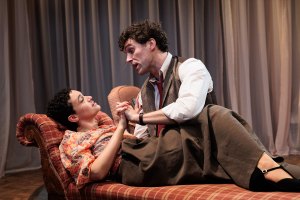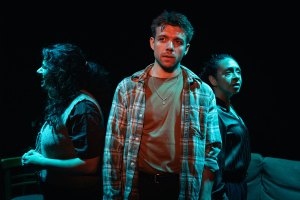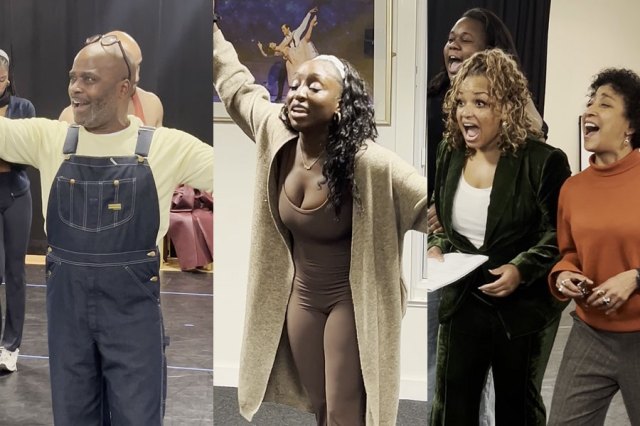20 Questions With…Penelope Wilton
Actress Penelope Wilton – who starts previews this week leading the cast of The House of Bernarda Alba, in David Hare’s new translation – talks about coming home to the National after a decade, the company of women & the appeal of history.
One of the leading ladies of the British stage, Penelope Wilton also has a long string of film and television credits to her name during a varied career.
Her myriad theatre credits to date include: The Norman Conquests, Betrayal, Vita and Virginia, The Cherry Orchard, The Seagull, Long Day’s Journey into Night, Heartbreak House, Landscape, Sisterly Feelings, The Secret Rapture, Major Barbara, Man and Superman, Piano, A Kind of Alaska and, in recent years, The Little Foxes (Donmar Warehouse) and Afterplay at Dublin’s Gate Theatre and in the West End.
Amongst the many accolades for her stage work, Wilton has twice won the Critics’ Circle Award for Best Actress: in 1981 for Much Ado About Nothing, and in 1993 for The Deep Blue Sea. She was awarded an OBE in the 2004 honours list.
Wilton’s extensive film and television work includes Calendar Girls, Shaun of the Dead, Pride and Prejudice, Iris, Ever Decreasing Circles, Carrington, The French Lieutenant’s Woman, The Borrowers, Talking Head and, just aired this week on ITV, Falling. She’ll also soon star alongside Christopher Eccleston in the new series of Doctor Who.
This month, Wilton returns to the National after a ten-year absence to lead the all-female cast in David Hare’s new version of Lorca classic, The House of Bernarda Alba. Directed by Howard Davies, the production runs in repertory at the NT Lyttelton.
Date & place of birth
Born 3 June 1946 in Scarborough.
Trained at…
I went to the Drama Centre, which was then in Chalk Farm. It was a three-year acting programme – we didn’t have degrees in those days!
Lives now in…
I live off Ladbroke Grove in west London.
First big break
It was playing Cordelia in Michael Hordern‘s King Lear, directed by Jonathan Miller. I’ve done most of my Shakespeare with Jonathan, including Measure for Measure, All’s Well That Ends Well and Twelfth Night, but I also did Much Ado About Nothing at the National with Peter Gill.
Career highlights to date
The Deep Blue Sea at the Almeida, which then transferred to the Apollo, and the original production of Pinter’s Betrayal at the National – those are the two big things. The Deep Blue Sea hadn’t been done much. It was thought of as an old-fashioned play. I worked with Karel Reisz for the first time then.
Favourite productions
I really don’t know. If I name some and leave out others, I may hurt other people, so I can’t really say!
Favourite co-stars
I very much liked working with my first husband Daniel Massey, and also with Michael Gambon. I have worked a lot with both of them individually, but we also all did the original production of Betrayal at the National Theatre in 1978 as well. I met Michael first when we did The Norman Conquests, then we did Betrayal, Much Ado About Nothing and Sisterly Feelings. Dan and I did a play called Bloomsbury, The Philanderer, Betrayal and Man and Superman.
Favourite directors
Most of the directors I’ve worked with have been marvellous, with one or two exceptions, so again I can’t really say!
Favourite playwrights
I very much like Harold Pinter‘s work. I did Betrayal, A Kind of Alaska and Landscape. And I’ve done a lot of David Hare‘s work. I did his second play, The Great Exhibition, and The Secret Rapture. He’s now written the translation for The House of Bernarda Alba, too.
What roles would you most like to play still?
I’d quite like to have a go at Cleopatra perhaps, and I’d like to play Mary Tyrone again in Long Day’s Journey into Night, which I previously did at the Young Vic.
Why do you like to return to the stage?
I’ve always done more theatre than anything else. I think theatre reflects our society. It talks about big subjects that aren’t just for now but before and after as well, and we can see ourselves reflected on the stage. It takes things seriously and is a very pure thing. It’s the oldest thing to do, telling each other stories. And theatre’s got everything, I think, that’s best about society – joining together to hear and see what other people are thinking about.
If you hadn’t been an actor, what would you have done professionally?
I would quite like to have been a historian, but I didn’t have enough education. I find history fascinating. It’s also reflects on what I do. I like researching parts I play, so history comes into it quite a lot.
What’s the best thing you’ve seen on stage recently?
I’ve just seen Peter Gill’s production of Owen McCafferty’s Days of Wine and Roses at the Donmar Warehouse. I really enjoyed it. It was beautifully directed.
What would you advise the government to secure the future of British theatre?
The boring bit – funding! But it’s also about individuals. If somebody like Michael Grandage goes up to the Crucible in Sheffield, it can suddenly make a huge difference. The people who hold the purse strings have to trust. Theatre is not something that you can altogether quantify, and it’s about so many other things that you can’t. If someone has a good record and wants to run a theatre, they should be given the chance to do it. Theatres come alive because people put their heart and soul into them. It’s always down to the individual and always has been. If somebody who’s really charismatic is in charge, they’ll get an audience because their energy will draw people in, and the community will start to be proud of it.
If you could swap places with one person (living or dead) for a day, who would it be?
I’d quite like to be Colette and have lunch with some rather interesting people!
Favourite books
My favourite novel is The Good Soldier by Ford Maddox Ford. It’s about relationships, but it’s a very different play on them. Recently, I very much enjoyed Antonia Fraser’s biography of Marie Antoinette.
Favourite holiday destinations
I love going to Europe. I don’t particularly want to go anywhere else. I like France, Italy and Greece, and I’ve just driven through Spain.
Favourite after-show haunts
I don’t really have any. If I’m taken out, I like to go to Sheekey’s. If I go myself, I go around the corner to wherever I am at the time!
Why did you want to accept the part of Bernarda in this production of The House of Bernarda Alba?
I wanted to do it because I read this adaptation. I’ve read others that are very tricky and stilted, but David Hare brings it to life – it’s very of-the-moment. The difficulty of translations is that they often seem a bit odd, especially with something like Lorca. This is his most realistic play, but even so, having read some of the earlier versions, it’s difficult to get right. The wonderful thing about subsidised theatre is that it needs to be cared for. This is not a commercial piece, it needs a longer rehearsal time, and for all those reasons, I wanted to do it here.
You play the mother of five daughters in an all-female story. What’s
The most intensive woman-only experience you’ve had in your own life?
I come from a family of three girls and my mother, and I have a lot of girl cousins. My mother had two sisters, so there were three of them there, too, plus two brothers. It’s a very female-orientated family so it doesn’t seem odd to me to be around a lot of women. The nice thing about the National is you play in repertoire, and there’s Henry IV coming on, so there are also lots of chaps about the place, too! We don’t feel entirely isolated as a company!
What’s so special about working at the National? Why have you been away so long?
I really enjoy it here. It’s a very nice place to work, it’s very well run.
Why has it been ten years since I last worked here? They haven’t asked me! As you get older, the parts for women are fewer. There haven’t been major changes since I’ve been away, not at all: some of the people who I worked with here first in 1978 are still here. Theatre, as anyone who runs a theatre will tell you, is a life-long commitment. The people here are brilliant at what they do. It’s not to do with money but to do with loving what you do.
Do you have a favourite line from the play?
Not a line, but there’s a wonderful scene when the girls are listening to the men going back to work, passing by on the street, and they stop what they’re doing.
How has the rehearsal process been for this play?
It’s a pretty rigorous play, so it’s not been without difficulties, but only because we want to get it right. I’ve never done Lorca before, and I’ve only seen Blood Wedding and The House of Bernarda Alba once before.
But earlier in the year, I went to where Lorca came from. It was a very interesting journey.
What are your plans for the future?
I’m going to go to the RSC to do Middleton’s Women Beware Women next at the Swan Theatre. I’m also in a new series of Doctor Who on television, with Christopher Eccleston in the title role, written by Russell T Davies. I’ve also just been seen in Falling, a television play with Michael Kitchen.
– Penelope Wilton was speaking to Mark Shenton
The House of Bernarda Alba runs in repertory at the NT Lyttelton from 15 March to 18 June 2005 (previews from 5 March).
** DON’T MISS our Whatsonstage.com Outing to The House of Bernarda Alba,
including an exclusive post-show Q&A with Wilton & other cast members! **
CLICK HERE TO BOOK & FOR MORE INFO!!!












